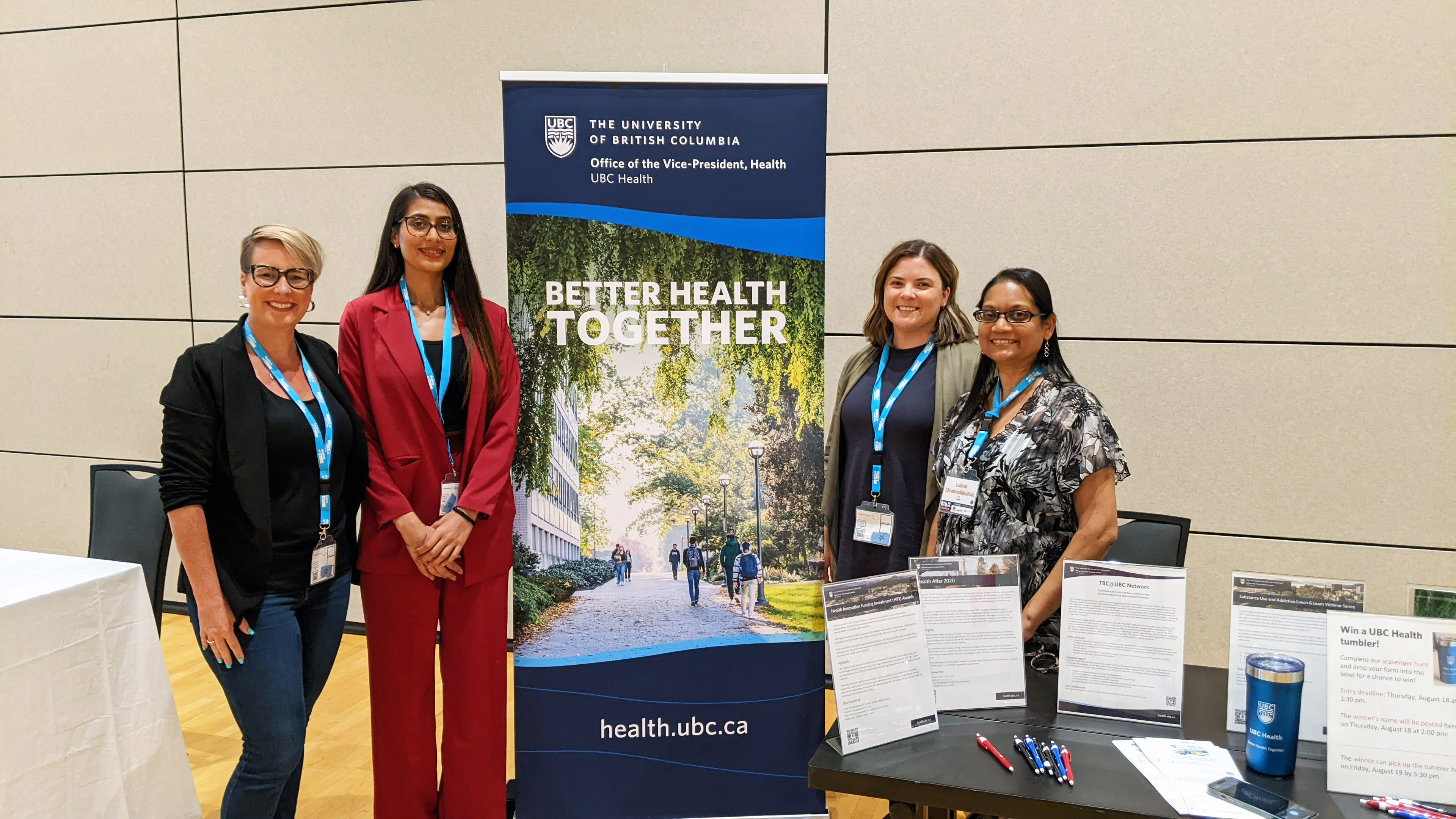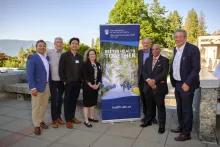
UBC recently welcomed nearly 250 in-person and virtual delegates from over 50 countries at the 2022 Towards Unity for Health (TUFH) conference held at the Vancouver campus in August. TUFH is an international, intersectoral, and intergenerational global health conference that brings together health partners, universities, community institutions, and thought leaders from around the world. Hosted by The Network: Towards Unity for Health, Rural Coordination Centre of BC, and BC Patient Safety and Quality Council, TUFH 2022 focused on fostering equitable community-oriented health services, education, and research, with the goal of improving health locally and globally.
With a commitment to equity, diversity, and inclusion, UBC Health supported efforts to ensure equitable participation in the conference and sponsored six students from lower income countries to attend the conference.
Priyanka Chahal (shown in the photo above with UBC Health staff at the conference) was one of those individuals. She is a medical student studying in the Kyrgyz Republic and has a keen interest in health policy and advocacy and a passion for community development and empowering young people. Priyanka delivered a presentation at the conference about the impact of telemedicine on healthcare delivery among Indigenous people during the COVID-19 pandemic.
“Approximately 370–500 million Indigenous people live worldwide, and due to their isolation, lack of financial resources, and cultural differences, Indigenous groups frequently face obstacles to obtaining healthcare,” she says. “Telemedicine has shown potentials in salvaging the dwindling healthcare system in low and middle-income countries. It is a practical and cost-effective treatment delivery method that has successfully addressed access barriers faced by vulnerable populations around the world.”
Priyanka says the conference was a valuable experience for her. “I learnt a lot from like-minded people, met many students like me, and discussed and listened to their ideas and shared knowledge on different topics. I will share my experience with all of the students at my university, so they can get inspired, and I am going to open a scientific society where I will encourage students to be in research field and to think beyond the box.”
The best part of the conference was that most participants presented their PhD work, which gave me the opportunity to learn new terms and topics.
Along with Priyanka Chahal, UBC Health sponsored Richard Buule (Uganda), Hui Wern Khaw (Malaysia), Cianna Lunan (Jamaica), Aabha Singh (India), and Saad Uakkas (Morocco).
Richard Buule, an aspiring surgeon, is passionate about inclusive leadership and social justice and wants to make the world a safe place for everyone. He presented about breast cancer screening among undergraduate students and a project to empower adolescents and young adults with knowledge about menstrual hygiene. Richard says he was able to network with health professionals from all parts of the world and learned a lot from the different presentations.
Hui Wern Khaw is a public health student and has been working as a community nutritionist for seven years. She presented about a peer training project for the prevention of childhood obesity, of which Malaysia has the second highest rate among the Southeast Asian countries. Hui Wern says she found the conference valuable because she learned about Canada’s culture and Indigenous people and had the opportunity to expand her connections with people from around the world.
Cianna Lunan, a medical student in her final year, is passionate about global health, social accountability in medical education, and meaningful youth engagement. She hopes to work with low middle income countries in developing healthcare systems that facilitate quality, affordable, and accessible care.
Cianna’s presentation focused on a program dedicated to curating activities and projects that support the mental health of students while combatting burnout. She says the TUFH conference was a great opportunity for students. It stimulated new interests, inspired, and exposed them to innovative work being done by other students and professionals to advance the global health agenda.
I will share my experience with all of the students at my university, so they can get inspired...
Aabha Singh, a master’s student in public health dentistry, explains that the gap of disease burden between the urban and rural in India is increasing. To address this inequity, health and wellness care centres are planned for villages to provide holistic healthcare, including oral health care. Her presentation was about interprofessional education for better oral health and a program for undergraduates from different disciplines delivered in a rural area. The program bridges the gap between different professions and develops an understanding among students about rural community needs.
“The best part of the conference was that most participants presented their PhD work, which gave me the opportunity to learn new terms and topics. There is a lot more to learn and explore in this field,” says Aabha.
Saad Uakkas, a master’s student in public health in his final year, hopes to continue his public health journey and involvement in program implementation to serve vulnerable communities. He presented on two topics: COVID-19 control and strategies to achieve equitably distribution of the vaccine around the world; and incorporating antimicrobial resistance and One Health (an approach to balance and optimize the health of people, animals, and the environment) into health student training curricula. In addition, he delivered a workshop on interprofessional education and intersectoral collaboration for students and young health workers.
As their work demonstrates, students have a key role in contributing to solutions that address challenges in health systems around the world.
UBC Health thanks these students for participating in the conference and sharing their experiences.
For more information about The Network: Towards Unity For Health (TUFH) and available learning opportunities, visit the TUFH website.
Posted September 20, 2022



